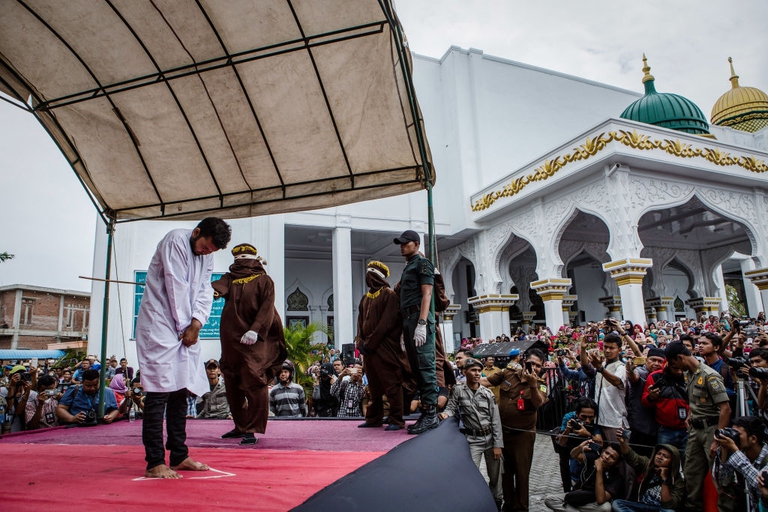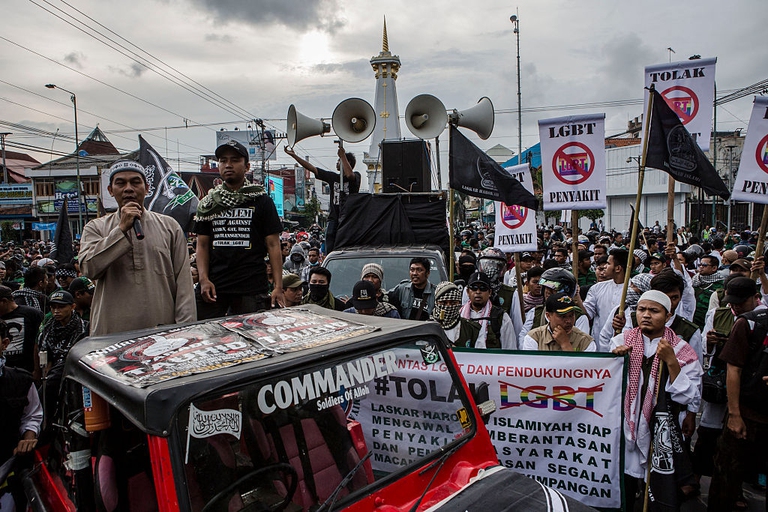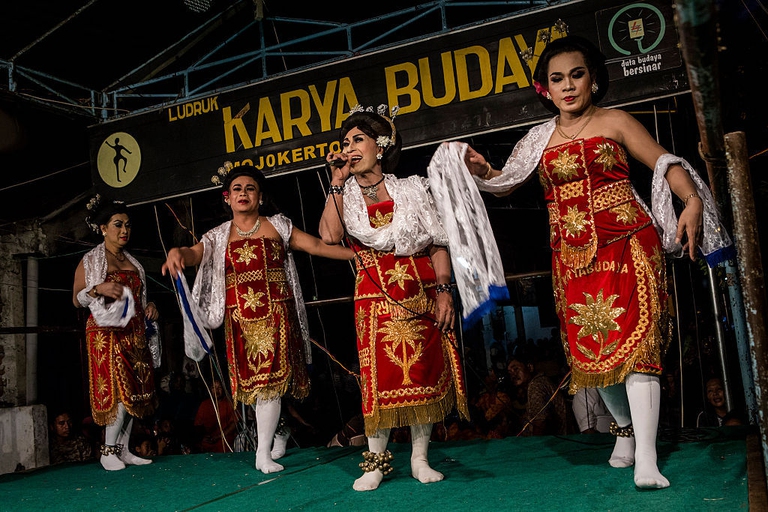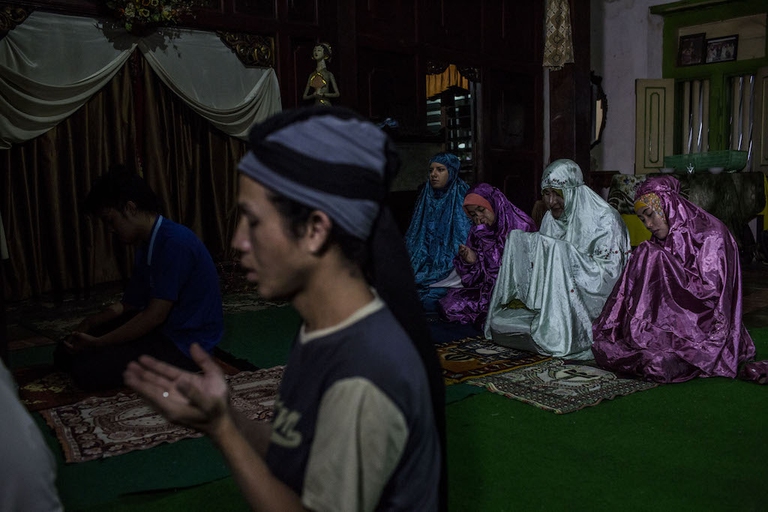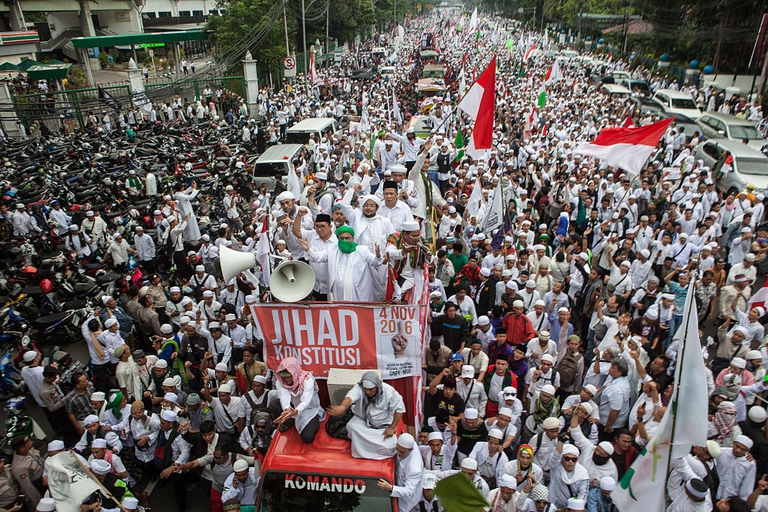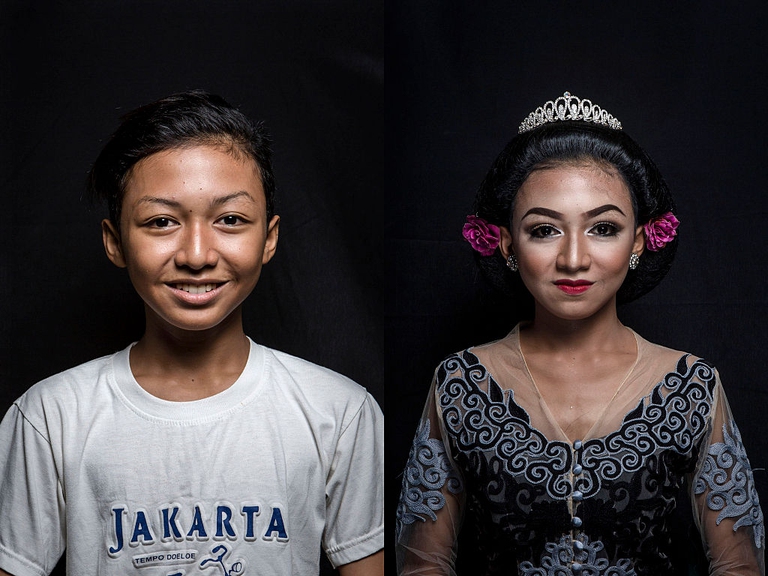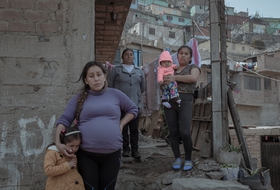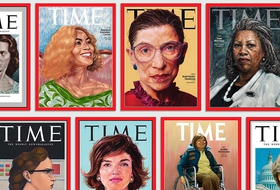
One in three women have suffered physical or sexual violence. With contributions from Europe, Africa, Asia and Latin America, we look at how this shadow pandemic affects every corner of the world.
The targeting of 12 allegedly transgender people in Aceh is another case of attacks on people who are perceived or identify as LGBT in Indonesia. Why this abuse has increased recently and what needs to be done to solve it.
Violence towards LGBT (lesbian, gay, bisexual, transgender) people is increasing in many parts of Indonesia. Religious conservatism and political agendas stand in the way of a social-cultural process that needs to take place so that people may work out their own views towards the role of this community in society. Law enforcement is urgently needed to stop people from becoming victims of disrespectful behaviour and even violence, so that debate in the country may evolve in a civilised manner.
A number of incidents of violence against the LGBT community have taken place recently in Indonesia. Accompanied by locals, police officers in Aceh, an Indonesian province ruled by Sharia (Islamic canonical law) targeted 12 people thought to be transgender, or waria in Indonesian. During a raid on beauty salons carried out on the 27th of January, they were forced to strip their shirts off and have their hair cut in public. They were also put in detention and forced to engage in physical exercises and voice trainings with the stated purpose of making them more “macho”.
Suara Kita, an organisation that fights for transgender rights, specified that only one of the 12 people was truly transgender. Three were regular visitors of the salon and the rest were employees of the establishment. Traumatised and feeling unsafe, they fled to Medan, in the province of North Sumatra, and its surrounding area after the incident.
Indonesia is historically familiar with the concept of transgender people or waria, a term which refers to men who appear and behave like women. In the country it is deemed as a “condition” determined by behaviour, rather than a facet of people’s identity. Sexual orientation is normally not mentioned or discussed in public. Traditionally, there are waria in the Bugis ethnicity, which is found principally in South Sulawesi, and in certain traditional dances and opera pieces.
When there is a fluid situation with regards to gender due to physical features, for example biological aspects such as children born with double genitalia or imbalances of male and female hormones from birth, the public will usually accept these with empathy. Waria have historically lived as part of families and communities. Although they’ve rarely been invested with leadership roles, singer and actress Dorce Gamalama is a trans woman whose fame is comparable to that of Oprah Winfrey in the US, demonstrating a level of acceptance towards waria.
Attempts to alter transgender people’s identity had until recently been limited to more moderate approaches, such as those adopted by religious leaders (not just Islamic ones) and violence against them hadn’t been common. In the city of Yogyakarta there is even a transgender Islamic boarding school offering training and education to waria. The latter have also been trying to fight for their rights, the latest example being the sex status statement on national identity cards. They’re also fighting to change people’s view that exclusively associates them with sex-related jobs.
However, unlike transgender people, Indonesian society is traditionally less familiar with lesbian, gay, and bisexual people and these are considered more difficult to accept as this identity is more directly related to explicitly sexual preferences.
In the last 20 years, the LGBT community has grown in Indonesia, becoming increasingly open and vocal. In addition, the presence of transgender people isn’t associated with specific professions anymore. Being LGBT has become a statement of identity and lifestyle that leans mostly towards Western traditions, including with regards to choice of dress, and consumption of alcohol and cigarettes. Discussion of sexual orientation, which in the past had been considered taboo, is now more openly stated in public.
However, public acceptance towards transgender people and the LGBT community as a whole has changed dramatically. Dislikes have turned into outright rejection and even phobia. A survey conducted by Saiful Mujani Research and Consulting in December 2017 shows that over 87 per cent of respondents felt threatened by LGBT people. And more than 53 per cent refuse the notion of having someone of this orientation in their family.
Religion is one of the main reasons behind such lack of acceptance. Even though Indonesia isn’t a religion-based nation, it plays a very important role in determining norms in the society. By law, Indonesia acknowledges five religions, but Islam is the dominant one. In Islamic teaching, homosexuality is categorised as a sin. However, interpretation of the way of addressing it splits into more radical and moderate approaches. In the current socio-political climate, the former is gaining prominence as opposed to the latter.
Violence towards LGBT people has worsened with escalating religious conservatism, which has intensified in the past years especially prior to regional and national elections: exploitation of issues associated with religion has proven to be the magic bullet in gaining more votes. Therefore, minorities have become easy targets. For example, the Muslim 212 Movement not only succeeded in impeaching the incumbent governor of Jakarta, Indonesia’s capital, Basuki Tjahaja Purnama, also known as Ahok, but also putting him in jail for alleged blasphemy towards Islam. Of Chinese ethnicity, he went from being a popular figure for spearheading progress in the development of the province, slimming the bureaucracy and jailing corrupt officials. Now, he has been sentenced to years in prison for blasphemy. As a result, the candidates supported by the 212 Movement won the election.
In this context, local governments and police let incidents of violence towards LGBT people occur, or worse, are even involved in the action. The Indonesian Legal Aid Institute (YLBHI) reported that there were at least 66 such cases of abuse in 2017. A survey by the Wahid Foundation, a think-tank focused on democracy and Islam, regarding community groups least accepted by wider society, is another example. In April 2016, LGBT were followed by “Communists” and people of Chinese ethnicity.
Currently there is no specific law on LGBT rights at the national level. There is only the Law on Marriage that permits only marriages and divorces between people of the same religion, and none of the acknowledged religions allow for same-sex marriage. In cases in which LGBT-related prosecutions have taken place in reference to the Penal Code (KUHP) these have fallen under the crime of molestation, regulated by Article 292 of the KUHP – the same used for punishing sexual abuse of children, for example. Exploiting momentum towards amending the Code in general, LGBT opponents are proposing for it to be expanded to making homosexuality in adults illegal, with nine years maximum jail penalty.
This amendment has been the subject of fierce debate amongst activists and community groups. Its progress within parliament has been slow and surrounded by political drama to win voters over. Recently, Zulkifli Hasan, the leader of the Higher House of Parliament (MPR) stated that five out of ten fractions in parliament have agreed on the revision, but refused to mention which ones. In the Lower House (DPR), sessions discussing this article have at this point never reached a sufficient level of attendance for a conclusion to emerge, thus the amendment has made very little progress.
Some regional governments have issued local legislation on the issue. In the cited case that took place in Aceh, for example, the police chief, as the representative of local government, purported to be implementing Sharia law due to the province’s status of special regional autonomy, known as Daerah Istimewa. This means that the central government doesn’t have the power to intervene. In addition, autonomy requires that regional and national laws don’t enter into conflict.
Legal certainty with regards to the LGBT issue is urgently needed now that Indonesia is entering the peak of political fervour prior to national elections in 2019. To avoid this minority increasingly falling victim to turbulence, the government needs to step up and play a more active role in stopping that dislikes turn into hate speech, physical abuse, intimidation and expulsion from neighbourhoods. Majority tyranny is unacceptable. The socio-cultural process of addressing LGBT issues in Indonesia can’t be rushed. By guaranteeing legal certainty, the government would provide a safe and even playing field for everyone, enabling the debate to evolve in the corridor of healthy democracy.
Siamo anche su WhatsApp. Segui il canale ufficiale LifeGate per restare aggiornata, aggiornato sulle ultime notizie e sulle nostre attività.
![]()
Quest'opera è distribuita con Licenza Creative Commons Attribuzione - Non commerciale - Non opere derivate 4.0 Internazionale.
One in three women have suffered physical or sexual violence. With contributions from Europe, Africa, Asia and Latin America, we look at how this shadow pandemic affects every corner of the world.
The Istanbul Convention against gender-based and domestic violence marks its tenth anniversary. We look at what it is, who its signatories are, and what the future might hold.
European Commission President Ursula von der Leyen reminded us of the gravity of violence against women around the world, and of the Istanbul Convention’s utmost importance.
President Erdoğan has pulled Turkey out of the Istanbul Convention, key in the fight against gender violence, claiming that it favours the LGBT community rather than family values.
Violence against women in Peru has increased as a result of Covid-19 lockdowns. 14,912 people were reported missing from January to November 2020, more than half of them minors and 64 per cent women. People have been confined to their homes for months, many forced to endure poor physical, economic and social conditions. A situation that
Joys Estefani Qqueccaño Huamani, 24, disappeared from her rural community in Peru on 9 October. Her family began looking for her independently of the authorities and despite the resistance of relatives of Joys Estefani’s ex-partner Arturo Ccana Condori, 32, charged with committing violence against her on 28 September, eleven days before Joys Estefani disappeared. Photos
Costa Rica celebrated its first same-sex marriage when two women, Alexandra Quiros and Dunia Araya, celebrated their wedding: an “extraordinary moment”.
The pandemic and its restrictions are affecting everyone, without exceptions. However factors like housing, income inequalities, gender, access to technology and working conditions are influencing how people experience the health crisis.
Time magazine’s 100 Women of the Year project sheds light on influential women’s stories, from Amelia Earhart to Greta Thunberg. A selection of some of the greats for International Women’s Day.
